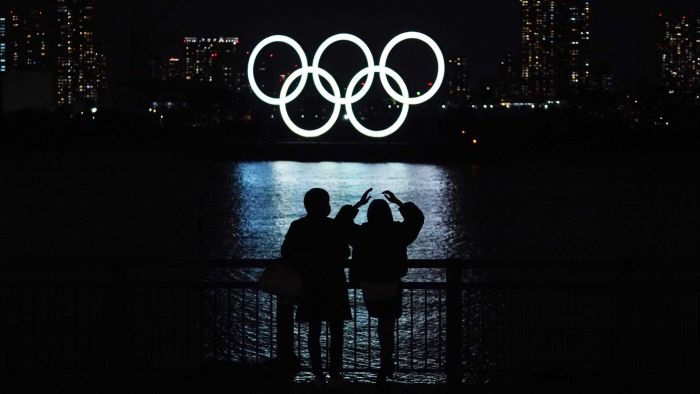The Tokyo Olympics and Paralympics will be Games like no other, with athletes required to wear a mask at all times unless they are eating or sleeping.
Key points:
- Athletes will have to submit an itinerary of their stay, avoid public transport and submit to regular tests
- About 80 per cent of people in Japan do not want the Olympics to be held this summer
- Japan’s hospitals are currently stretched because of coronavirus infections
They will also sound like no other, with organisers wanting people to show their support by only clapping their hands and not by chanting or singing.
With just under six months to go until the Olympics are due to begin in Tokyo, organisers have unveiled plans to keep athletes, spectators and locals safe from coronavirus, in an effort to shift the narrative from one of great uncertainty and fear to one of hope.
They have released the first version of their “playbook” for athletes and officials.
More than 15,000 competitors are expected at the July 23–August 8 Games, which were postponed from last year because of the pandemic.
With a recent poll suggesting about 80 per cent of people in Japan do not want the Games to be held this summer, and coronavirus cases rising across the world, organisers are battling to prove they can hold the event safely in Tokyo.
Athletes will have to submit an itinerary of their stay, avoid public transport, have tests before departure and on arrival in Japan, and also submit to testing every few days during the Games.
They will also have to download the Japanese Government’s contact tracing application and severely curtail social interactions.
But they will not have to quarantine themselves in hotels like tennis stars were made to do at the 2021 Australian Open.
“You will see athletes being in a position to train and do what they have to do in order to prepare for the Games,” the International Olympic Committee’s Games operations director Pierre Ducrey said.
“When it comes to athletes, [they will have an] activity plan and this adapted quarantine that they will have to go through so they will be able to do what they have to do, whether they are staying in the Olympic Village or if they are … participating in a pre-games training camp somewhere in Japan.”
Olympics with no spectators a possibility
One of the principles of the playbook is that people should “support athletes by clapping and not singing or chanting”.
But as this playbook is only for international sporting federations, officials wouldn’t say if this would extend to fans.
They are yet to decide how many — or if — spectators will even be allowed into venues, with the decision to be made by April.
“When you have spectators, you would expect them to behave according to the context that we are facing at that point in time and I would say that everyone will be acting responsibly,” said Christophe Dubi, the IOC’s Olympic Games Executive Director.
“Whether it’s a playbook or another set of information, we will ask the spectators also to respect a number of rules and let’s see whether the chanting or the shouting in the stadium is one of them.
“But at this point of time we have not looked into this.”
Organisers say safety is the number one priority and that they hope this playbook will reassure the public.
But they are expecting that there will be cases of infection despite rigorous preventive measures.
“The virus will not completely disappear, wherever you are anywhere in the world,” said Tokyo 2020 Olympics Delivery Officer Hidemasa Nakamura.
“Inputs will be taken into account to remove the concerns [of the public] by the time [of the Games].”
COVID remains a threat in Japan

The coronavirus situation is not currently under control in many parts of Japan, as evidenced by the Government’s decision to extend a state of emergency in Tokyo and nine other prefectures for another month.
While case numbers have started to come down, hospitals remain stretched.
Tokyo recorded 676 new infections on Wednesday after peaking at 2,000 in early January.
Under the state of emergency, the Government has urged people to stay at home as much as possible and asked bars and restaurants to cut opening hours.
But unlike other countries that have imposed serious penalties for noncompliance, Japan currently has no penalty for those refusing to cooperate with the requests.
The country’s Parliament is likely to soon pass new laws to impose fines, but dropped plans to include prison sentences.







